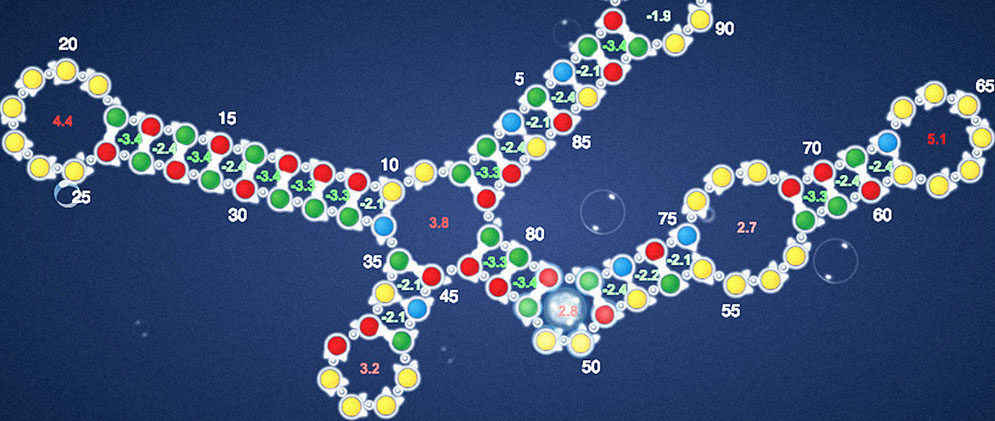EteRNA: Accelerating Knowledge Creation for RNA Bioengineering through Internet-Scale Gaming
From The Theme
KNOWLEDGE WORKER PRODUCTIVITY
WHAT IF
What if technical contributions from citizen scientists could be crowd sourced to accelerate scientific research?
WHAT WE SET OUT TO DO
With the EteRNA project, we aimed to rapidly advance RNA (ribonucleic acid) bioengineering, and overcome the limits of the traditional “trial and error” design cycle within individual labs. Towards that end, the EteRNA team organized an online gaming interface that leveraged the results of public RNA design competitions sourced from a community of over 20,000 citizen scientists. Competition results were rigorously scored by wet-lab feedback conducted by credentialed scientists. We implemented and rigorously tested innovations on two fronts: new design-selection systems and agent-based game playing to promote automation of player intuition.
WHAT WE FOUND
The resulting project framework provided a generalizable design pattern for future crowd-sourced discovery that harnesses the collective creativity and intuition of knowledge workers. We found that gamification can substantially amplify knowledge creation, but requires significant investment of time, money and effort. An online “strategy marketplace” enabled people to interact with each other, sharing ideas for novel hypothesis and methods. A successful approach empowered volunteer participants by testing their contributions, enabling rapid prototyping and even market testing of nascent ideas. This project advances social computation by integrating experimental feedback within internet-scale gaming. In the process, we created high impact, practical bioengineering tools and generated an unprecedented library of validated data.
LEARN MORE
Eterna Website
Treuille, A., and Das, R. (2014) “Scientific rigor through videogames.” Trends in Biochemical Sciences 39 (11) : 507 – 509
Lee, J., Kladwang, W., Lee, M., Cantu, D., Azizyan, M., Kim, H., Limpaecher, A., Yoon, S., Treuille, A., Das, R., and EteRNA Participants (2014) “RNA design rules from a massive open laboratory” Proceedings of the National Academy of Sciences U.S.A. 111 (6) : 2122 – 2127
PEOPLE BEHIND THE PROJECT
 Rhiju Das is Associate Professor Biochemistry at Stanford University School of Medicine. He is the Principal Investigator at the DAS Lab, where he and his teem seek a predictive understanding of how RNA and protein molecules code for complex biological machines. Dr. Das leads the Eterna massive open laboratory, which couples a 100,000-player videogame to the lab’s massively parallel experimental tools, the first such platform in citizen science.Dr. Das’s research has been recognized with the Burroughs-Wellcome Career Award at the Interface of Science, a W.M. Keck Medical Research Program award, and the OpenEye/American Chemical Society Outstanding Junior Faculty Award.
Rhiju Das is Associate Professor Biochemistry at Stanford University School of Medicine. He is the Principal Investigator at the DAS Lab, where he and his teem seek a predictive understanding of how RNA and protein molecules code for complex biological machines. Dr. Das leads the Eterna massive open laboratory, which couples a 100,000-player videogame to the lab’s massively parallel experimental tools, the first such platform in citizen science.Dr. Das’s research has been recognized with the Burroughs-Wellcome Career Award at the Interface of Science, a W.M. Keck Medical Research Program award, and the OpenEye/American Chemical Society Outstanding Junior Faculty Award.
 Daniel Schwartz is Dean of Stanford Graduate School of Education and Nomellini & Olivier Professor of Educational Technology. He is an expert in human learning and educational technology. Schwartz oversees a laboratory whose computer-focused developments in science and math instruction permit original research into fundamental questions of learning. He has taught math in rural Kenya, English in south-central Los Angeles, and multiple subjects in Kaltag, Alaska. This diversity of experience informs his work. Among many honors, Schwartz was named Graduate School of Education Teacher of the Year for 2015.
Daniel Schwartz is Dean of Stanford Graduate School of Education and Nomellini & Olivier Professor of Educational Technology. He is an expert in human learning and educational technology. Schwartz oversees a laboratory whose computer-focused developments in science and math instruction permit original research into fundamental questions of learning. He has taught math in rural Kenya, English in south-central Los Angeles, and multiple subjects in Kaltag, Alaska. This diversity of experience informs his work. Among many honors, Schwartz was named Graduate School of Education Teacher of the Year for 2015.
 Adrien Treuille is an Assistant Professor of Computer Science and Robotics at Carnegie Mellon University, working in the computer graphics group. Dr. Treuille pursues research in the simulation and animation of very high-dimensional nonlinear phenomena like animal morphology, human motion, and large fluid systems. His research addresses the complexity of such systems by developing model reduction tools that generate compact representations.
Adrien Treuille is an Assistant Professor of Computer Science and Robotics at Carnegie Mellon University, working in the computer graphics group. Dr. Treuille pursues research in the simulation and animation of very high-dimensional nonlinear phenomena like animal morphology, human motion, and large fluid systems. His research addresses the complexity of such systems by developing model reduction tools that generate compact representations.
